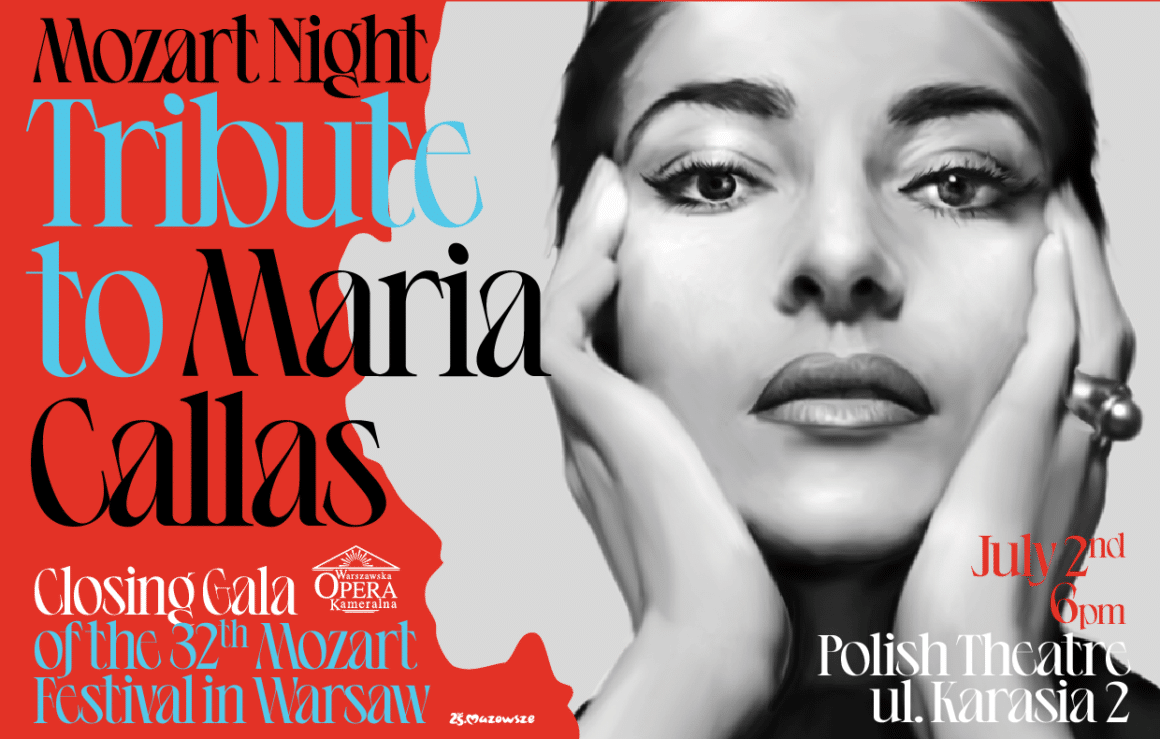Mozart Night – Tribute to Maria Callas
Closing Gala of the 32. Mozart Festival in Warsaw
Arnold Szyfman Polish Theatre
Tomasz Cyz – director
Alicja Węgorzewska – artistic concept
Katarzyna Łuszczyk – lighting director
Monika Stolarska – video
Agata Koschmieder – costumes
Katarzyna Gabrat-Szymańska – scenographic cooperation
Agata Ślósarska-Bastgen – production
CAST:
Joanna Moskowicz – Konstanze
Katarzyna Drelich – Queen of the Night
Ana Naqe – Elettra, Medea
Natalia Rubiś – Donna Elvira
Gabriela Legun – Donna Anna
Dorota Szczepańska – Zerlina, Susanna
Ewa Tracz – The Countess
Actors:
Tomasz Nosiński
with the special participation of Maria Dębska
The event will be hosted by:
Alicja Węgorzewska, Jerzy Snakowski
Musicians of Ancient Instruments Ensemble of Warsaw Chamber Opera
Musicae Antique Collegium Varsoviense
Conductor
Nikol Kraft
***
In programme:
Wolfgang Amadeusz Mozart
The Abduction from the seraglio
Ouverture
Singt dem grossen Bassa Lieder
Ach ich liebte
The Marriage of Figaro
Ricevete, o padroncina
Porgi amor
Don Giovanni
Ah! chi mi dice mai
Vedrai, carino
Idomeneo, Re di Creta
Placido è il mar, andiamo
D’Oreste, d’Ajace
Don Giovanni
Non mi dir
Ah, fugi il traditor
The Abduction from the seraglio
Traurigkeit ward mir zum Lose
PAUSE
The Marriage of Figaro
Ouverture
Che soave zeffiretto
Don Giovanni
Or sai chi l’onore
The Marriage of Figaro
Deh, vieni non tardar
Dove sono i biei momenti
Don Giovanni
Mi tradì quell’alma ingrata
The Magic Flute
Der Hölle Rache kocht in meinem Herzen
O Isis und Osiris
Luigi Cherubini
Medea
Taci Giason? De tuoi figli la madre
Wolfgang Amadeusz Mozart
The Abduction from the seraglio
FINALE: Martern aller Arten
Unusually rough love
Maria Callas, originally Maria Anna Cecilia Sophie Kalogeropoulos, was born in New York on 2 December 1923 and died on September 16th 1977 in Paris. She owes her surname to her father, who, for practical reasons, initially changed it to Kalos and finally to Callas. It was her mother who encouraged Maria to sing and tried to develop her vocal talent. Her first opera role was the part of Santuzza in Pietro Mascagni’s Cavalleria Rusticana, but it was the title role in Giacomo Puccini Tosca which made her a star.
In Italy, where she achieved spectacular success in the title role in A. Ponchielli’s Gioconda, she met the conductor Tullio Serafin, whom she revealed in one of her interviews: working with Serafin was the really lucky opportunity. He taught me that there must be an expression; there must be a justification. He taught me the depth of music, the searching for the essence in character portrayal. Her dramatic soprano quickly paved the way to the most important stages. Many critics praised her bel canto technique, wide vocal range, and dramatic interpretations. Her repertoire included both classical opera seria and the bel canto operas of Donizetti, Bellini, and Rossini, as well as works by Verdi and Puccini, and in her early career, she did not shy away from Wagner’s music dramas.
And how was it with Mozart? One could say that it was perhaps, as she herself said, the most unsuccessful musical marriage in her history. She recorded only four arias and the aforementioned stage portrayal. And that was basically it. She revealed:
Mozart is undoubtedly an extraordinary genius and I cannot imagine the world without him, but generally speaking his operatic music does not really take me out of this world. It is the Mozart of the piano concertos that I love passionately.
Maria Callas recorded four Mozart arias: Porgi, amor from The Marriage of Figaro, two arias of Donna Anna and Mi tradì quell’alma ingrata of Donna Elvira from Don Giovanni. Paradoxically, although she spoke about these portrayals with restraint, the opinions of her fans who admired her talent speak volumes. Tullio Serafin said about Callas that this woman can sing anything written for the female voice, and Leonard Bernstein, seeking analogies between her Countess and Mozart’s Andante from the Bassoon Concerto in B-flat major, K. 191, called Callas the Bible of opera.
And what connects the Warszawska Opera Kameralna with Maria Callas?
Alicja Węgorzewska-Whiskerd, the director of the Warszawska Opera Kameralna, received the prestigious Maria Callas Tribute Prize in December 2019, which she accepted during a gala in New York. This is not the only thread connecting WOK with Callas. Jean-Claude Malgoire – conductor, chamber musician, virtuoso of the oboe and English horn, and a close friend of Maria Callas – has worked multiple times with the Warszawska Opera Kameralna, appreciating, among other things, the artistry of Warszawska Opera Kameralna. This was evident when he invited the Warszawska Opera Kameralna musicians to his theatre Atelier Lyrique de Turcoing in France, and also when he conducted performances in Warsaw – Jean-Baptiste Lully’s Alceste in 1997 and André Campry’s Tancrède in 2008.
Piotr Iwicki


